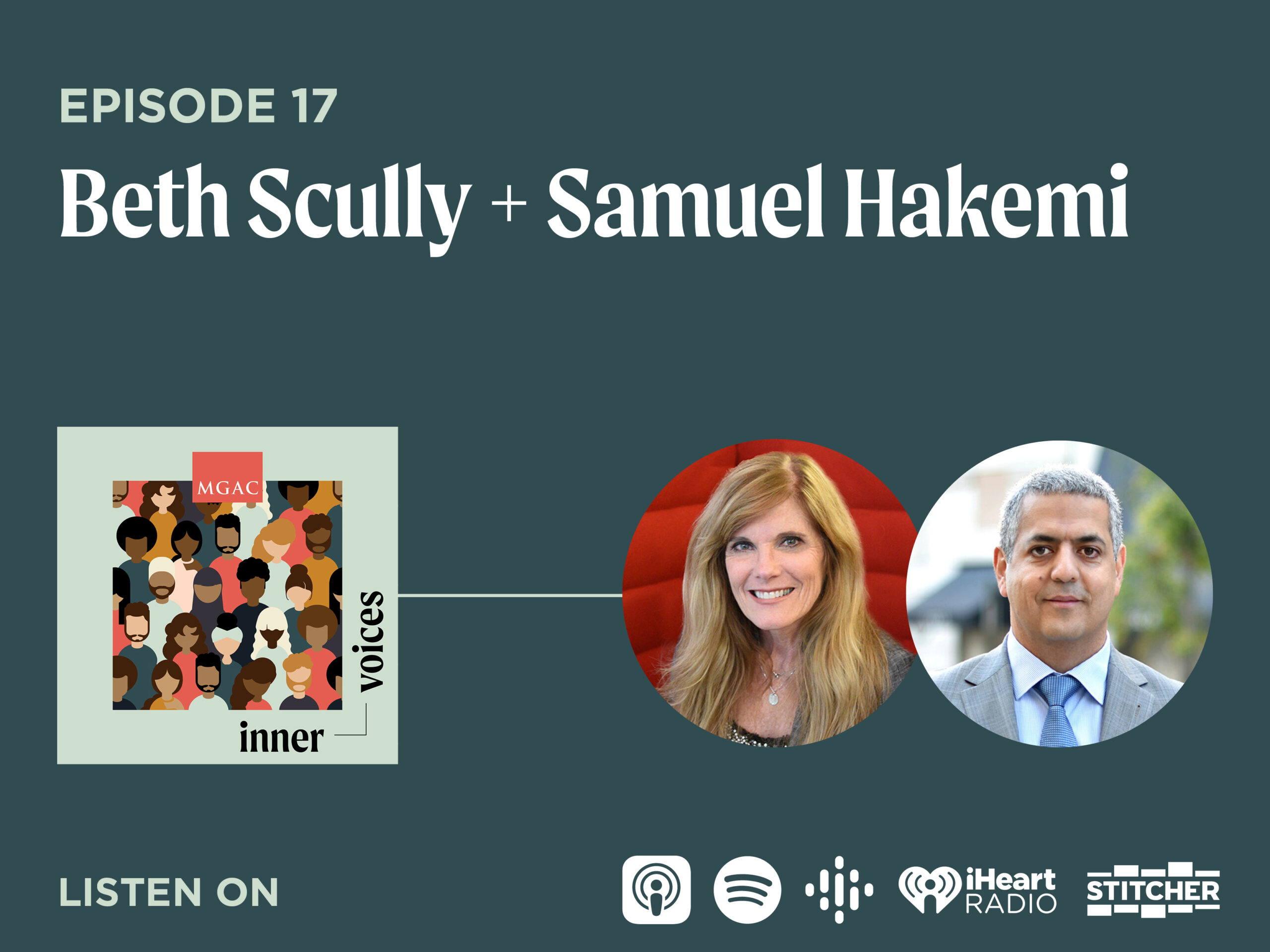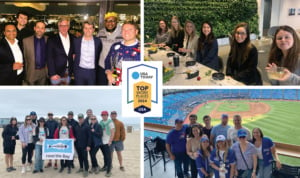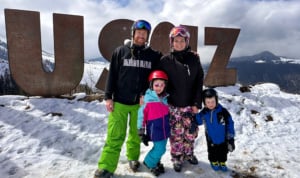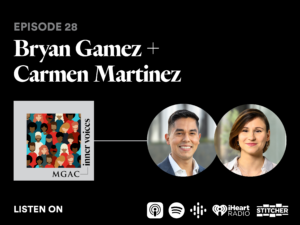MGAC Inner Voices: Episode 17

MGAC Inner Voices is an interview format podcast where a diverse mix of employees are interviewed to share their perspective on challenges they have faced in the A/E/C industry as a result of their identity—including race, ethnicity, religion, age, gender, sexuality, ability, etc. By discussing the experiences of our staff, our hope is that their stories will have newfound and powerful resonance with the audience—both to comfort others in similar situations and to encourage those in positions of power to bring about positive, actionable changes to workplace environments for all A/E/C professionals, regardless of their identity.
This month, Beth Scully (MGAC Senior Project Manager, Seattle) talks with Samuel Hakemi (MGAC Senior Project Manager, Canada) about living through the Iranian regime change, polarization, and how he’s teaching his son to navigate discrimination.
View Transcript
Transcript
Beth: Hi, and welcome to MGAC 's "Inner Voices," a podcast digging into issues of diversity, equity, and inclusion in the architecture, engineering, construction industry, brought to you by MGAC. I'm Beth Scully, and I'm residing in Seattle, Washington. I'm a senior project manager at MGAC.
We wanna preface our podcast by saying we are not experts in all things diversity, equity, and inclusion. I can speak to my lived experience and do my best to help our guests share their experiences as well. Our goal is not to be experts on diversity, but rather, we wanna share our stories and figure out how together we can create better outcomes for all of us in the AEC industry and beyond.
Today, I have the great pleasure of talking with Samuel Hakemi. I've had the pleasure of chatting with Samuel prior. But Samuel, can you tell our listening audience a bit more about yourself, beginning with your position, the location, your time at MGAC, and just your professional background and time in our industry?
Samuel: Yes, thanks, Beth. I'm a senior project manager with Toronto MGAC office, and I've been with MGAC since late 2013. Prior to MGAC, I've worked in various roles as a manager, contract administrator, and earlier in my career in technical aspects of commercial, industrial, and residential architecture. I've been with the industry for about 24 years, 12 of which has been solely dedicated to project management and owner representation.
Beth: Years of experience and a lot of variety there for you Samuel.
Samuel: Yes.
Beth: Yeah. So, Samuel, I know because we've chatted that you were not born and raised in North America. How would you describe the discrimination you felt in your early years in life?
Samuel: That's correct, Beth, I was born in Tehran, which is a city, the capital city in Iran, I spent a good chunk of my life, early years of my life growing up in Iran with my family. And at some point, we decided to emigrate to Canada. Most older Americans and Canadians may remember back in 1979 Iranian monarchy was overthrown by the Islamic Revolution, which led to a whole bunch of other events throughout the history.
Well, soon after that, the regime started changing its revolutionary message and leaning heavily on implementing Islamic views into its policies and rules. My dad at that time was an Air Force officer. And given the close ties that the Iranian Air Force had with the U.S. and former Shah of Iran, they were automatically viewed as kind of an anti-Islamic revolution group. So, as the government continues to track down the pro-monarchy folks in the country and reinforce Islamic laws, military families and those who were not participating in Islamic ideology were automatically targeted.
So, this marginalization and discrimination were not benign and subtle. It was very aggressive, it was in your face, and very intrusive. And that is, in essence, the discrimination that we started feeling back in Iran. It impacted every aspect of our life. Over the years of discrimination its impact and its wounds on the family was so much that, at some point, we just decided that it's time for us to move. And that's when we left Iran and we more or less never looked back.
Beth: Right. So, it was this sudden change of power and suddenly you found yourselves in the position of being very much discriminated against. Your family experienced these wounds as a result. And I'm wondering, can you reference for us and share how old you were at that time, and how that shaped your view of discrimination?
Samuel: I was young, I was around seven, eight years old, and kind of theoretic country and ideology that it was becoming, it kind of created this polarity in the country that we felt throughout my teenage years as I was growing up there. So, it turned from a society that every religion and type of person was accepted, it turned into a two-tier society where now you had a group that was pro-Islamic, and then pretty much everybody else.
So, the pro-government ideology was something that was preached and talked and observed. And for the folks that weren't practicing that or weren't part of that or viewed differently, they started essentially living a double life. So, people started apologizing for their thoughts and behaviors. And the public face and social face that you had was very much...in my life was very different than the one that you had in and amongst your close friends and family.
And to me, I mean, the polarization was the first manifestation of discrimination in that society. And it ended up being extremely destructive, not to just my family, to a lot of families who ended up leaving that country. And it doesn't have any boundaries. It doesn't stop. It just goes until it kind of achieves what it needs to do. I don't know if that puts it in more of a context of how it was. But it's definitely kind of a tip of the iceberg when it comes to the level of discrimination and the way you feel.
Beth: Absolutely it does. And I appreciate your candor in sharing that with us, and the polarization of what happens to a society and to even then drill down what happens to us as individuals, right, this sort of forward-facing person and then who you really are. And, you know, that is an unfortunate byproduct of discrimination, right?
Samuel: That's correct, yeah.
Beth: You can't be candid, you can't be transparent about who you are and what you believe. And that's what's brought us here today, you know, to have a candid conversation about how discrimination does polarize us. And I know that you and I have chatted also about how you're raising your kids, and I'd love for listeners to know more about your thoughts in finding ways that everyone can exist.
Samuel: Absolutely. So, as you mentioned that polarization is a byproduct of discrimination, but it is absolutely true vice versa. So, as the society becomes polarized, you end up discriminating, and that discrimination goes not just one way, it goes both ways. When we talk about polarity, anybody who knows anything about physics knows that any type of force kind of demands another opposite direction force. So, when we talk about a polarized society, it starts divisions, it starts placing people in different silos. And when that happens, it's when you feel like you're marginalized. It feels like now a different set of rules apply to you or don't apply to you.
You know, I have a 10-year-old son. We often talk about, especially when we're driving somewhere, various topics that we raise and talk, and racism, discrimination, acceptance, it comes up in many of those conversations. I can't separate myself from what I've experienced in the past growing up in Iran and how discrimination can be destructive.
So, what I teach my son is that, you know, you have to have a strong sense of community. And this is something that we're really good at in North America, in Canada, in U.S. is that people do really care about the city that they live in, the street that they grew up and play. That sense of community is strong, and it's one of the best qualities of North America I think.
And I try to teach him to be mindful of the humanity in the city, not just the people, and try to see how your thoughts, actions, words, impact everyone and not just one group. Any polarization is a fertile ground for ideologies of discrimination, racism, hate, and that is, in its essence, trying to see yourself separate from the society and the group that you live in. And it grows in various degrees and strengths, you know, some people who see themselves completely separated as the society they live in, and some people see only aspects of their life that are separate than the others.
But that, in some shape or form, it's gonna give to some sort of discrimination. It could be benign and not noticeable or it could act itself out in what I was witnessing when I was growing up. When it completely gets out of hand and quite literally people are approaching you on the street, attacking you on the street, attacking your family, and saying that you don't belong, "Leave or do what I tell you to do," that's when it gets destructive.
And I think over the years in history, various nationalities and groups in different age groups and different timelines in the history of mankind have felt it and have seen it, right? I was just unlucky to have witnessed it firsthand right in front of me where, you know, people single you out and you don't have the same rights and privileges as the others. And that's something that I became mindful of when I came to Canada. I really honestly didn't know the depth of the world of discrimination or what it really means until I moved to Canada where people are conscious of discrimination and racism.
And that's when it really kind of made sense that back home, the country that I looked like everyone else and I was born there, I was discriminated against for many years, which means that discrimination is not really based on color of your skin, or sexuality, or belief, or nationality. It's that separation, it's that polarity that divides us, right? And I think the more knowledge we have, the more we talk about it and understand why and how, the more that polarity goes away and you come in the middle and you kind of accept the people that you live with, as opposed to just tolerating them.
That's what I try to teach my son, and that's how we kind of discuss this. And we keep it open. So, he may have ideas or thoughts that are not really in line with what is the norm or acceptable these days, but I welcome those discussions and talks because the more we talk about it, the more he's educated in that respect, and the more he understands why we need to respect folks within our city and within our society and accept them the way they are and try to build a ground, a workplace, a home, a society, a city that people are not singled out. People have a way of living their life and doing what they need to do in order to survive and live and be happy without feeling like they have to live a double life, which I did for many years back in Iran, right?
Beth: Right. I love your sense of community, and that the diversity of opinion, the diversity of the community is only strengthened, right, and it reduces these polarizing factions that arise and happen. And I'm wondering if we can turn towards your professional life, and how your unique identity makes you a strong asset to the team. And how has it informed you and who you are professionally?
Samuel: Very good question. When you grow up in Iran and in that type of environment, when you come here and you kind of correct yourself and way of thinking and way of doing to understand why things are the way they are, it makes you stronger and it makes you, in some ways, braver. My whole family stands in the face of that type of discrimination. We're not shy to stand up for it and say something purely and simply because, again, I don't want my son to leave this country because it becomes so bad. We have an obligation within our workplace, within our city to be mindful of those behaviors and those thoughts.
I think professionally, what I can bring to the table is the notion that we're able to work and include others that have the ability to work and perform without really considering their background. So, in my profession, there are many...in my city in Toronto have reached out to newcomers to the country or people who have struggled in their life in making it. And I've made every effort to be helpful in trying to introduce him to different processes and things like that. So, in my career, I have achieved certain things that made me who I am and bring me to where I am in my line of work and career.
So, I try to extend those out, essentially, the knowledge and the experience that I have in everyone, especially those who are less fortunate or in a precarious type of situation, being new to the city or new to the country to help them move forward and get that. To me, that is a form of helping bridge the discrimination because the discrimination could be against somebody who just moved to a new country and doesn't know the ways around it and just gets turned down because you don't have any experience, right? So, it helps in that respect. So, I think that's something that I'm cognizant of and I try to do it professionally.
Beth: That's marvelous, and who knew that you're actually a talent scout?
Samuel: I wouldn't go that far, but if I can be of help, yes, for sure.
Beth: Yeah, I think it's amazing to identify when somebody is obviously very talented but just doesn't know how to maneuver the system. Your recognition of that, I applaud you for that. It's awesome, and your deep sense of community. So, how do you think we can bake the sense of DE&I into MGAC and our colleagues?
Samuel: Honestly, I am proud to be part of MGAC. Every time I've come to D.C. to meet my colleagues there, I feel a sense of home. And I've never ever felt that I'm an outsider. Everybody is respectful, everybody is thoughtful. Before the Toronto office became larger, I worked with folks in the D.C. office, and really geographical distance didn't make any difference as to how others have helped me grow and helped me in work.
And I think what we need to do, in my opinion, at MGAC, doing what we're doing, like, I appreciate the fact that you're leading these podcasts and putting the message out there. So, I think that's a step in the right direction. The fact that Mark is very open and encouraging in every aspect of company and has always been a support in every aspect of career and personal life is truly something that is unique to MGAC.
And I think we should just look at continuous improvement, be mindful and open and have discussions about things that are important to our corporate culture, individual culture. And if somebody, for any reason, feels like they're marginalized, their voice doesn't get there and they need to talk, I think we should have the openness and the ability to listen to them and try to see what the concerns are and how we can help to make our company a better company.
Beth: Yeah, I think what we're agreeing upon here, and certainly exploring is that sense of being an ally, yes, and being a colleague who is an ally. And what advice would you give to people if they are wondering, "Hey, am I an ally?" Or, "How can I be a better ally?" For people who feel marginalized or excluded from community, what advice would you offer?
Samuel: Be brave, stand up, have a conversation, because sometimes certain things in our minds are perceptions and we think they're facts or they're actual ways the way people think. I mentioned to you before, Beth, that where I service the project in Newfoundland, people are quite curious. It's just their culture. They ask a lot of questions. And sometimes that can come across as people are trying to put you in a box. So, a lot of people there get offended or they feel threatened when somebody asks where you're from or they ask anything about your background. And I think just having that openness, and being brave, and having the discussion and not feeling shy about having those discussions is something that helps us in that respect. So, I think my three words would be be brave, stand up to issues, and have a conversation.
Beth: Just brilliant. Thank you for that. If only we could just really digest those words and live those words, right? It seems simple to offer. But, you know, I appreciate that you're sharing that and you can bring it down to just the simplicity. I'm amazed how quickly the time flies when we have these chats, yeah, but I just wanna close by asking if there's anything else you wanna share, and to offer my gratitude for you're coming on to our podcast and participating with us. I appreciate you so much.
Samuel: Thank you for hosting it and thank you for tenaciously working at it and finding a time to do it, do your job as well. So, thank you for that. And yeah, I think I don't like anybody, whether you're black or white, gay or straight, to feel like they are separated. I think that's very important. And as a person of this society, this community, I want to make sure that everybody feels welcome. You know, North America offers a lot of opportunity to a lot of people, whether you were born here or not. And the fact that we're able to talk about it, and the fact that we're able to actually bring it to the surface and make changes should be something that we put front and center in every aspect of our life and make constructive changes that is welcoming to all, not just one group, but every group. And be always mindful of the polarities that we create when we talk about something and we go too far in one direction. So, that's something that I'm gonna keep in my mind. And again, thanks for hosting this.
Beth: Thank you so much, Samuel.
Samuel: No problem.
Beth: Appreciate you. And with that, we will close off our podcast today. And we hope that you enjoyed listening to Samuel and his journey.








